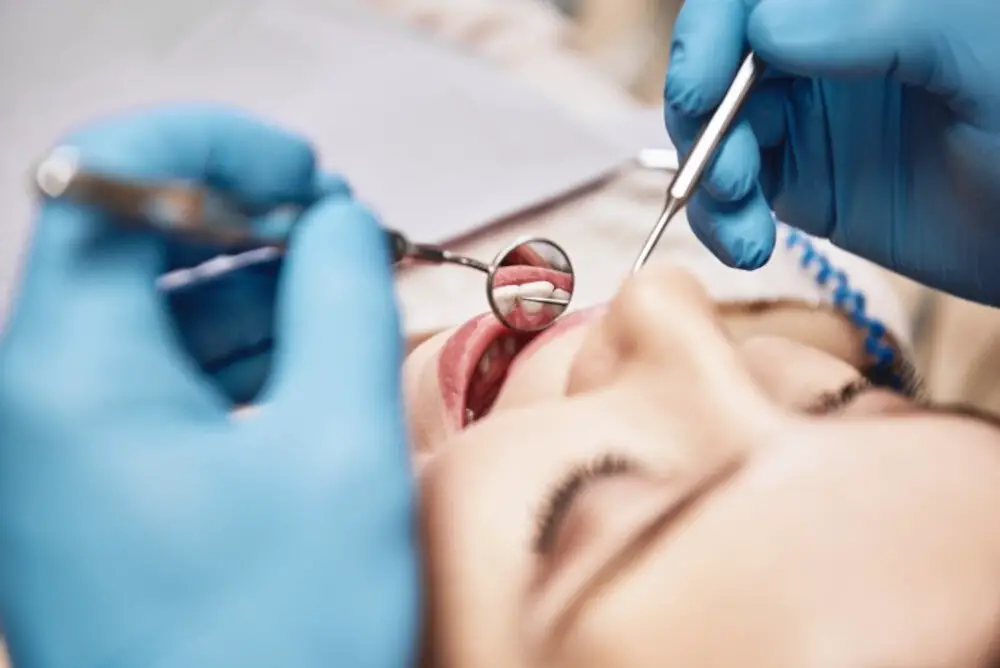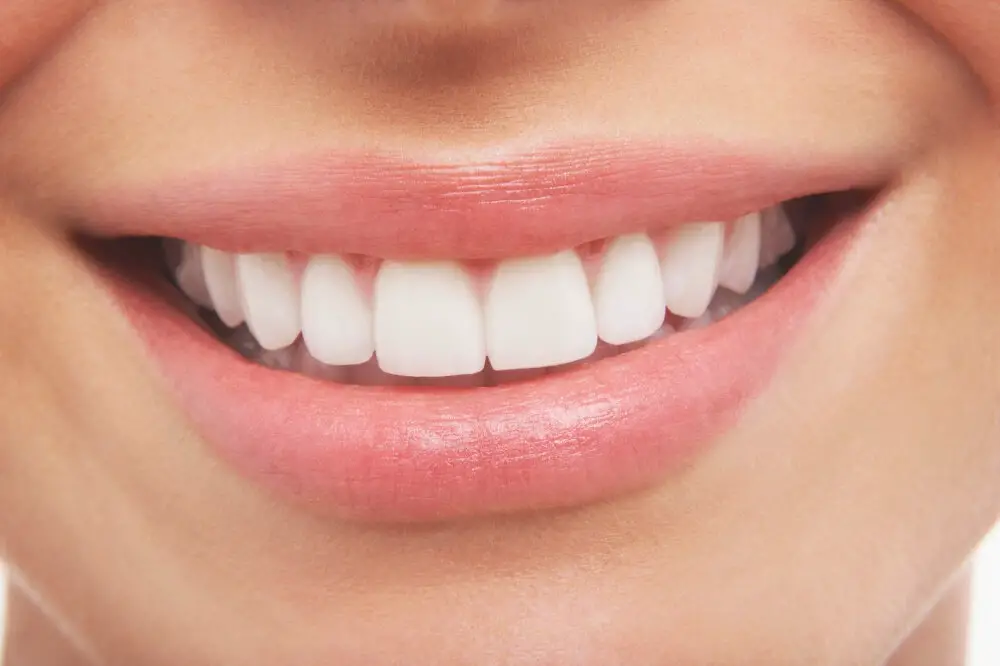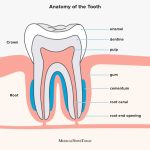Sensitive Teeth? Discover Why Cold Water Causes Painful Sensations

Sensitive teeth can be a real pain, quite literally. If you’ve ever taken a sip of cold water or bitten into a frozen treat only to be met with a sharp, shooting pain in your teeth, then you know exactly what I’m talking about. But have you ever wondered why this happens? What is it about cold water that causes such painful sensations in our teeth? In this article, we’re going to explore the science behind sensitive teeth and discover the reasons why cold water can be such a source of discomfort. For many people, sensitive teeth are a daily struggle that can impact their quality of life. It’s estimated that around 40 million adults in the United States alone suffer from some form of tooth sensitivity. Whether it’s caused by tooth decay, gum disease, or simply brushing too hard, sensitive teeth can be a frustrating and uncomfortable condition to deal with. But understanding the underlying causes of tooth sensitivity is the first step in finding relief. So, let’s dive into the world of dental science and explore why cold water causes those painful sensations in our teeth.
Sensitive teeth refer to a common dental condition where individuals experience discomfort or pain when consuming cold, hot, sweet, or acidic food and drinks, or when exposed to cold air. This condition is caused by the exposure of the tooth’s dentin, a porous layer that lies beneath the enamel, to external stimuli. The dentin contains tiny tubules that connect to the tooth’s nerves, causing pain or discomfort when stimulated. Sensitive teeth can affect people’s lives by causing discomfort and pain, leading to difficulty in eating certain foods and drinks, and reducing the quality of life. Therefore, it is essential to seek dental care to address the condition and improve oral health.
Understanding Tooth Sensitivity

Tooth sensitivity is a common dental problem that affects a significant number of people. It occurs when the tooth’s enamel wears down, exposing the underlying layer of dentin. Dentin contains microscopic tubules that lead to the tooth’s nerve endings. When exposed to stimuli such as cold or hot temperatures, acidic or sweet foods, or even brushing, these nerve endings can be triggered, causing sharp pain or discomfort. Tooth sensitivity can be caused by a variety of factors, including gum recession, tooth decay, and aggressive brushing. Understanding the underlying cause of tooth sensitivity is essential to finding the right treatment and preventing further damage to the teeth. One of the most common causes of tooth sensitivity is gum recession. When the gums recede, the tooth’s root is exposed, which is not covered by enamel and contains a high concentration of nerve endings. The root’s exposure can cause sensitivity to temperature changes or pressure. Tooth decay and cavities can also lead to tooth sensitivity. If left untreated, decay can penetrate the tooth’s enamel, exposing the dentin layer. The bacteria in the decay can also irritate the nerve endings and cause sensitivity. Additionally, aggressive brushing or using a hard-bristled toothbrush can wear down the enamel and cause sensitivity. Using a soft-bristled toothbrush and practicing gentle brushing techniques can help prevent enamel erosion and tooth sensitivity.
Tooth sensitivity is a common dental problem that affects millions of people worldwide. It is characterized by a sharp, sudden pain or discomfort in the teeth when exposed to cold, hot, sweet, or acidic foods or drinks. The pain can range from mild to severe, depending on the individual’s sensitivity level. The most common causes of tooth sensitivity include enamel erosion due to acidic foods or drinks, tooth decay, gum recession, and aggressive brushing. Other factors such as cracked teeth, worn-out fillings, and grinding can also contribute to tooth sensitivity. To prevent tooth sensitivity, it is essential to maintain good oral hygiene practices and visit your dentist regularly for check-ups.
Understanding the anatomy of a tooth is crucial to comprehend tooth sensitivity. Each tooth is divided into three main parts: the enamel, the dentin, and the pulp. The enamel is the outermost layer and is the hardest substance in the human body. The dentin lies beneath the enamel and is made up of tiny tubes that contain nerve endings. The pulp is the innermost layer and contains blood vessels and nerves. When the enamel erodes, it exposes the dentin, which can cause sensitivity to hot, cold, sweet, or acidic substances. The nerve endings within the dentin become irritated, leading to pain. Therefore, maintaining good oral hygiene practices, such as brushing and flossing regularly, can help prevent tooth sensitivity and keep the enamel intact.
Why Cold Water Triggers Painful Sensations

Sensitive teeth are a common dental problem that affects millions of people worldwide. It is a condition in which the teeth become hypersensitive to hot, cold, sweet, or sour stimuli, causing pain and discomfort. One of the most common triggers of sensitive teeth is cold water. When exposed to cold water, the nerves in the teeth react by sending a sharp, shooting pain signal to the brain, which can be quite uncomfortable. The reason why cold water triggers painful sensations is due to the dentin, a layer of tissue that lies beneath the tooth enamel. When the enamel is worn down or damaged, the dentin becomes exposed to external stimuli, such as cold water, which can cause pain and discomfort. The dentin contains tiny tubules that connect to the nerve endings in the pulp of the tooth. When exposed to cold water, the tubules contract, and the fluid inside them moves, stimulating the nerve endings and causing pain. Additionally, cold water can cause the teeth to contract and expand, which can also trigger pain signals. It is essential to note that sensitive teeth can be caused by various factors, such as gum disease, tooth decay, and aggressive brushing. Therefore, it is crucial to maintain good oral hygiene practices and seek professional dental advice to manage and treat sensitive teeth.
Cold water can cause discomfort in sensitive teeth due to the exposure of the underlying dentin layer. The dentin contains microscopic tubules that lead to the nerve endings of the tooth. When the enamel of the tooth becomes worn down or the gums recede, the dentin can become exposed to stimuli such as cold water. This can trigger a painful sensation as the nerve endings are stimulated. In addition, the contraction and expansion of the tooth caused by extreme temperature changes can also lead to discomfort in sensitive teeth. It is important for individuals with sensitive teeth to practice good oral hygiene and seek treatment from a dental professional to prevent further damage and alleviate pain.
Hot or warm water can provide relief from tooth sensitivity by expanding the blood vessels in the teeth, which helps to reduce the pain. When tooth sensitivity occurs, the nerves in the teeth become more exposed to external stimuli, such as cold water. This exposure causes the nerves to become overactive, leading to a painful sensation. However, when hot or warm water is applied to the affected area, it helps to increase blood flow, which helps to minimize the pain. Additionally, warm water helps to soothe the gums and reduce inflammation, which can also contribute to tooth sensitivity. While hot or warm water can help alleviate sensitivity, it is important to note that it is not a permanent solution and should be used in conjunction with other dental treatments to address the underlying issue.
Other Triggers of Tooth Sensitivity

Tooth sensitivity is a common dental issue that affects millions of people worldwide. While cold water is one of the most common triggers of tooth sensitivity, there are several other factors that can cause painful sensations in your teeth. One of these triggers is acidic foods and drinks. Consuming acidic substances such as citrus fruits, soda, and vinegar can wear away the enamel on your teeth, exposing the dentin underneath and leading to sensitivity. It’s essential to limit your intake of acidic foods and drinks and rinse your mouth with water after consuming them to minimize the damage they can cause. Another trigger of tooth sensitivity is teeth grinding or clenching. Grinding or clenching your teeth can wear away the enamel on your teeth, making them more sensitive. If you grind or clench your teeth, speak to your dentist about getting a mouthguard to wear at night to protect your teeth. Additionally, brushing your teeth too hard can also cause sensitivity. Brushing your teeth too hard can wear away enamel and expose the dentin underneath. Always use a soft-bristled toothbrush and brush gently to avoid damaging your teeth.
In addition to cold water, there are several other common triggers of tooth sensitivity that can cause painful sensations. Sweet and acidic foods are among the most notable culprits, as they can wear away at the protective enamel on teeth and expose the underlying nerves. Other triggers may include hot or cold beverages, teeth grinding or clenching, gum recession, aggressive brushing, and certain dental procedures such as teeth whitening or root canal treatments. While tooth sensitivity can be uncomfortable and even painful, there are several strategies that can help manage and relieve symptoms, such as using desensitizing toothpaste, avoiding trigger foods and drinks, and practicing good oral hygiene habits.
If you suffer from sensitive teeth, there are several things you can do to avoid or manage sensitivity triggers. One of the most effective ways is to use a toothpaste specifically designed for sensitive teeth. These toothpastes contain ingredients that help to desensitize the nerves in your teeth, reducing pain and discomfort. Another tip is to avoid foods and drinks that are particularly cold or hot, as extreme temperatures can exacerbate sensitivity. If you do consume something cold or hot, try to drink it through a straw or eat it with a spoon to avoid direct contact with your teeth. Additionally, be mindful of your brushing technique, as brushing too hard or using a hard-bristled toothbrush can wear away your enamel and expose the sensitive dentin layer underneath. By taking these steps, you can effectively manage your sensitive teeth and enjoy a more comfortable, pain-free smile.
How to Prevent or Treat Sensitive Teeth

Having sensitive teeth can be a frustrating and uncomfortable experience. Fortunately, there are several methods to prevent and treat sensitive teeth. One of the most important steps is to practice good oral hygiene. Brushing twice a day with a soft-bristled toothbrush and using fluoride toothpaste can help to remove plaque and strengthen tooth enamel. It is also essential to floss daily to remove food particles and bacteria from between teeth. Additionally, using a fluoride mouthwash can help to protect teeth from sensitivity and decay. Another effective way to prevent sensitive teeth is to avoid acidic and sugary foods and drinks. Acidic foods and drinks can erode tooth enamel, making teeth more sensitive. Sugary foods and drinks can cause tooth decay, which can lead to sensitivity as well. It is also important to avoid clenching or grinding teeth, as this can wear down tooth enamel and cause sensitivity. If you grind your teeth at night, wearing a mouthguard can help to protect teeth from damage and sensitivity. Finally, if you do experience sensitivity, there are several treatments available, such as desensitizing toothpaste, fluoride treatments, and dental bonding. Your dentist can recommend the best treatment for your individual needs.
To prevent or reduce tooth sensitivity, there are several steps you can take. Firstly, it’s essential to practice good oral hygiene by brushing twice a day, flossing once a day, and using mouthwash. This helps to remove plaque and prevent tooth decay, which can lead to sensitivity. Secondly, avoid consuming acidic or sugary foods and drinks, as they can erode tooth enamel and expose the sensitive dentin layer. Thirdly, use a soft-bristled toothbrush and brush gently in circular motions to avoid damaging the enamel. Finally, consider using toothpaste specifically designed for sensitive teeth, which contains ingredients that block the nerve endings in the teeth, reducing sensitivity. Remember, if your tooth sensitivity persists or worsens, it’s essential to consult your dentist for a proper diagnosis and treatment plan.
Sensitive teeth can cause discomfort and pain in everyday life. Fortunately, there are various treatment options available to help alleviate this problem. One popular option is desensitizing toothpaste, which contains ingredients like potassium nitrate or strontium chloride that can help block pain signals from reaching the nerves in your teeth. Another option is dental procedures, such as bonding or the application of dental sealants, which can help protect the exposed roots of your teeth. In more severe cases, your dentist may recommend a root canal or gum graft surgery to address the underlying issue causing your tooth sensitivity. It’s important to consult with your dentist to determine the best treatment plan for your specific case of sensitive teeth.
Sensitive teeth can cause painful sensations when exposed to certain stimuli, such as cold water. This occurs when the protective outer layer of the tooth, known as enamel, becomes worn down or the gums recede, exposing the underlying dentin. Dentin contains small tubules that lead to the nerves of the tooth, making it more sensitive to temperature changes. Additionally, certain lifestyle habits, such as consuming acidic foods or brushing too aggressively, can further wear down the enamel and exacerbate tooth sensitivity. Proper dental hygiene, including using a soft-bristled toothbrush and avoiding acidic foods, can help prevent and alleviate tooth sensitivity.
Tooth sensitivity can be a painful condition that affects many individuals, making it difficult to eat or drink their favorite foods and beverages. Seeking professional dental care is crucial for individuals with tooth sensitivity, as it can be a sign of more severe dental issues, such as tooth decay, gum disease, or enamel erosion. A dental professional can provide a thorough examination to determine the root cause of sensitivity and provide targeted treatment options to reduce pain and discomfort. Additionally, regular dental check-ups can help prevent tooth sensitivity from developing in the first place, ensuring that individuals can enjoy their favorite foods and beverages without discomfort. Don’t let tooth sensitivity impact your quality of life – schedule a dental appointment today!
Conclusion

In conclusion, sensitive teeth can be a frustrating and painful condition to deal with, especially when everyday activities such as drinking cold water cause discomfort. However, understanding the root cause of this sensitivity can help individuals take steps to alleviate their symptoms. Whether it’s using a desensitizing toothpaste, avoiding acidic foods and drinks, or practicing good oral hygiene, there are various ways to manage this condition. By taking a proactive approach to sensitive teeth, individuals can enjoy their favorite foods and drinks without the fear of painful sensations.







